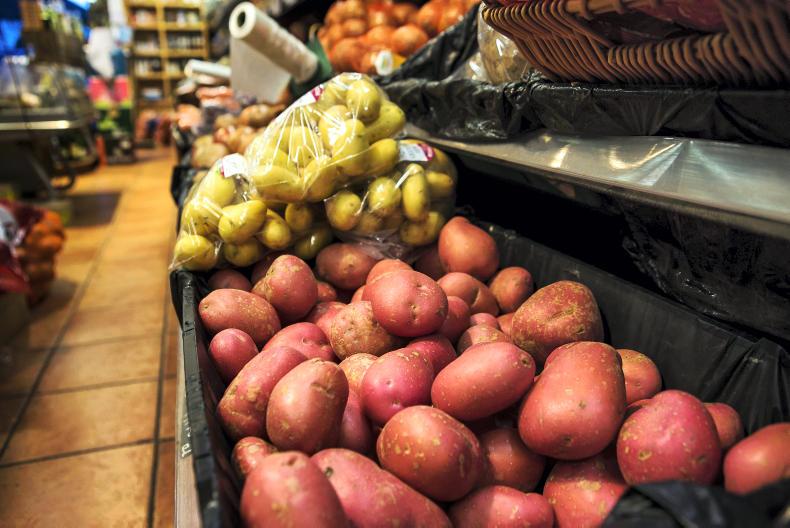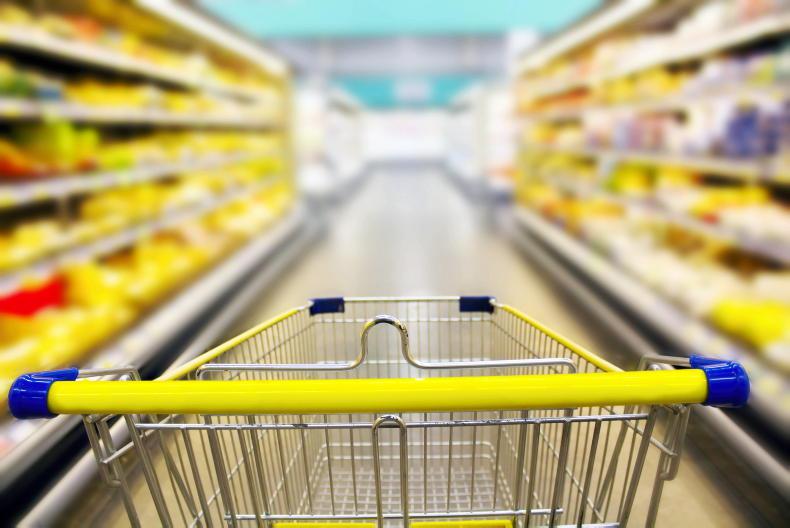Increased tariffs and new regulatory checks could lead to price increases of up to 45% on some everyday food items should World Trade Organisation (WTO) tariffs come into effect in the event of a no-deal Brexit, retailers have warned.
Retail organisations from Ireland, Northern Ireland and Britain issued a joint warning on food prices on Thursday morning, highlighting how a no-deal Brexit would lead to increases in the cost of making fresh food and drink available to consumers.
While WTO most-favoured nation tariffs could be the top line tariffs, there are also concerns regarding the cost implications of non-tariff barriers such as checks and delays.
Avoidance
The trade bodies were united in their call for a solution, arguing that the time for brinksmanship and political games has long past.
A no-deal outcome would have devastating economic consequences, potentially jeopardising years of positive economic development and integration across the UK and Ireland, they said.
They warned that it is imperative that this be avoided.
Thomas Burke of Retail Ireland said: “A no-deal Brexit would have devastating economic consequences and must be avoided.
“However, regardless of the type of Brexit agreed over the coming weeks, retailers will see an increase in their operating costs arising from checks at ports and other supply chain disruption. In the current operating environment, these additional costs simply cannot be absorbed and will have to be passed on to consumers in the form of higher prices.
A no-deal Brexit would have devastating economic consequences and must be avoided
“Our members continue to work hard to plan for all possible eventualities, but the ongoing uncertainty is damaging our industry and impacting our customers,” he said.
Hard border
Aodhán Connolly of the Northern Ireland Retail Consortium said that a no-deal Brexit brings tariffs, customs processes, checks and costs that the industry, and Northern Ireland families in particular, cannot afford to absorb.
“Our households already have half of the discretionary income of British households and less than those in the Republic of Ireland. A no-deal Brexit will hit us first and hit us hardest. This is not acceptable.
“A hard Brexit means a hard border and the disintegration of supply chains that have been built up over 40 years of EU membership. This is not a binary choice for Northern Ireland between trade with the UK and trade with the EU.
“Our economy is built on access to both markets and we need that to survive. No-deal makes NI a less competitive place to do business and a more expensive place to live,” he said.
William Bain, head of EU and international at the British Retail Consortium, also added that it is not just the people on the island of Ireland that this will affect.
“Those in Britain will see the price of goods from Ireland and Northern Ireland rise. Our supply chains are highly integrated, with food ingredients coming from both Ireland and the EU, and 60% of the £2bn of NI agri-food bound for Britain crosses the Irish Sea via Dublin. This will affect the price of shopping in the prime minister’s constituency of Maidenhead in the same way as it will in Belfast or Dublin, with cost rises,” he said.
Read more
Exclusive: cheap food imports threat from no-deal Brexit plans
UK plans to open doors to Brazilian beef
Brexit: UK farmer views
Increased tariffs and new regulatory checks could lead to price increases of up to 45% on some everyday food items should World Trade Organisation (WTO) tariffs come into effect in the event of a no-deal Brexit, retailers have warned.
Retail organisations from Ireland, Northern Ireland and Britain issued a joint warning on food prices on Thursday morning, highlighting how a no-deal Brexit would lead to increases in the cost of making fresh food and drink available to consumers.
While WTO most-favoured nation tariffs could be the top line tariffs, there are also concerns regarding the cost implications of non-tariff barriers such as checks and delays.
Avoidance
The trade bodies were united in their call for a solution, arguing that the time for brinksmanship and political games has long past.
A no-deal outcome would have devastating economic consequences, potentially jeopardising years of positive economic development and integration across the UK and Ireland, they said.
They warned that it is imperative that this be avoided.
Thomas Burke of Retail Ireland said: “A no-deal Brexit would have devastating economic consequences and must be avoided.
“However, regardless of the type of Brexit agreed over the coming weeks, retailers will see an increase in their operating costs arising from checks at ports and other supply chain disruption. In the current operating environment, these additional costs simply cannot be absorbed and will have to be passed on to consumers in the form of higher prices.
A no-deal Brexit would have devastating economic consequences and must be avoided
“Our members continue to work hard to plan for all possible eventualities, but the ongoing uncertainty is damaging our industry and impacting our customers,” he said.
Hard border
Aodhán Connolly of the Northern Ireland Retail Consortium said that a no-deal Brexit brings tariffs, customs processes, checks and costs that the industry, and Northern Ireland families in particular, cannot afford to absorb.
“Our households already have half of the discretionary income of British households and less than those in the Republic of Ireland. A no-deal Brexit will hit us first and hit us hardest. This is not acceptable.
“A hard Brexit means a hard border and the disintegration of supply chains that have been built up over 40 years of EU membership. This is not a binary choice for Northern Ireland between trade with the UK and trade with the EU.
“Our economy is built on access to both markets and we need that to survive. No-deal makes NI a less competitive place to do business and a more expensive place to live,” he said.
William Bain, head of EU and international at the British Retail Consortium, also added that it is not just the people on the island of Ireland that this will affect.
“Those in Britain will see the price of goods from Ireland and Northern Ireland rise. Our supply chains are highly integrated, with food ingredients coming from both Ireland and the EU, and 60% of the £2bn of NI agri-food bound for Britain crosses the Irish Sea via Dublin. This will affect the price of shopping in the prime minister’s constituency of Maidenhead in the same way as it will in Belfast or Dublin, with cost rises,” he said.
Read more
Exclusive: cheap food imports threat from no-deal Brexit plans
UK plans to open doors to Brazilian beef
Brexit: UK farmer views









SHARING OPTIONS